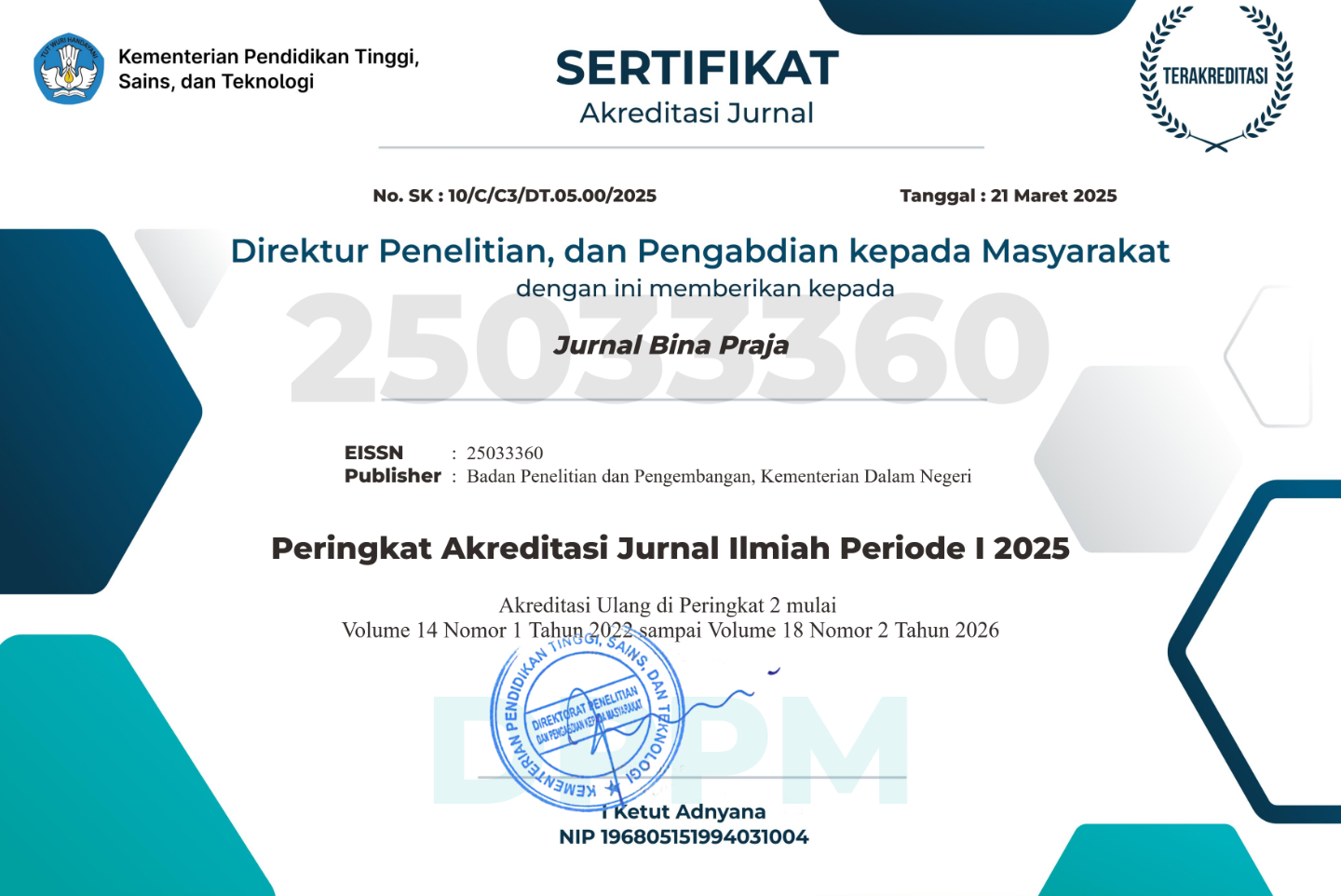Analisis Korelasi Faktor yang Mempengaruhi Implementasi Sistem Resi Gudang (SRG) di Daerah
DOI:
https://doi.org/10.21787/jbp.05.2013.91-100Keywords:
Sistem Resi Gudang (SRG), Pembiayaan, Korelasi Faktor, Warehouse Receipt System (SRG), Financing, Correlation FactorsAbstract
Abstrak
Akses terhadap sumber pembiayaan tunai yang liquid sangat penting guna kesinambungan kegiatan produksi petani, sehingga adanya kendala dalam mengakses pembiayaan pada akhirnya akan menghambat produksi, produktifitas dan pengelolaan pemasaran produk pertanian. Sistem Resi Gudang (SRG) dapat dijadikan alternatif pemecahan masalah, dimana SRG dapat dijadikan sebagai agunan bank, untuk memperpanjang masa penjualan hasil produksi petani, mewujudkan pasar fisik dan pasar berjangka yang lebih kompetitif, mengurangi peran pemerintah dalam stabilisasi harga komoditi, dan memberi kepastian nilai minimum dari komoditi yang diagunkan.Tujuan utama dari penelitian ini adalah untuk melihat hubungan faktor-faktor yang mempengaruhi pelaksanaan pilot project SRG di daerah yang menerapkan SRG; dan merumuskan usulan kebijakan dan petunjuk teknis untuk meningkatkan efektivitas pelaksanaan SRG. Prinsip metode analisis yang digunakan adalah dengan menggunakan standard error sebesar 5 % dengan menggunakan software SPSS, untuk melihat korelasi faktor. Berdasarkan analisis terdapat hubungan antar faktor-faktor yang mempengaruhi pelaksanaan pilot project SRG yaitu factor Koordinasi antar Bank, dimana Gudang dan Koperasi sejauh ini tidak berjalan dengan baik, hal ini disebabkan tidak adanya unsur kepercayaan dari pihak Bank sebagai institusi pembiayaan  Faktor berikutnya adalah Hubungan antara Pemerintah Daerah dengan Koperasi, dimana saat ini sudah berjalan dengan baik, akan tetapi hubungan dengan perbankan dan para pengelola gudang belum berjalan dengan baik. Faktor lainnya yang mempengaruhi penerapan pilot project SRG adalah, faktor Produksi dan faktor Kredit Likuiditas.
Â
Abstract
Access to financing sources is very important for the sustainability of the production activities of farmers, the constraints in accessing financing will ultimately impede the production, productivity and management of the marketing of agricultural products. Warehouse Receipt System (SRG) could be an alternative way to overcome the problem, which can be used as collateral, to extend the sale of production of farmers, realizing the physical market and futures markets more competitive, reducing the government's role in the stabilization of commodity prices, and give certainty minimum of commodity collateral. The main objective of this study was to examine the
relationship of the factors that affects the implementation of the pilot project, and formulate policy proposals and technical guidance to enhance the effectiveness of SRG implementation. The principle of the analysis method which used is use the standard error of 5% with SPSS software, and to see the correlation factor. Based on the analysis of relationship exists between the factors that affect the implementation of the pilot project are Bank Coordination, where storage and cooperative is not running well, this is due to the absence of the element of trust from the bank as a financial institution. The next factor is the relationship between the Local Government
Cooperative, where it's been going well, but the relationship with the banks and the managers of the warehouse is in the contrary. Another factor affecting the implementation of the SRG pilot project are production factors and factors Credit Liquidity.
Downloads
References
ADB, Draft Policy Note, “UZB: Supply and Demand for Credit.â€, 2006.
Akiyama T., Baffes J., Larson D. and Varangis P. (eds.) “Commodity market reforms: lessons of two decadesâ€, Regional and Sectoral Studies, The World Bank, Washington, 2000.
Badiane O, Goletti F., Kherallah M., Berry P., Govindan K., Gruhn P., and Mendoza M. (1997) “Agricultural input and output marketing reforms in African countriesâ€, Final Donor Report, International Food Policy Research Institute (IFPRI), 1997.
Bamako, Innovation in Microfinance: “Warehouse receipts: financing agricultural producersâ€, 1999.
Beck Thorsten , Hanohan Patrick,“Making finance work for Africa.â€, 2007.
Budd N, “The legal and regulatory framework for warehouse receipts in commodity distribution, credit and hedgingâ€, Paper presented at Workshop on Warehouse Receipt Financing: making the difficult deals easier and more profitable, Amsterdam, July 9-11, 2001.
Coulter J. and Onumah G.E, “The impact of government policy and regulation on the effectiveness of warehouse receipt systems: the case of Africaâ€, Paper presented at Workshop on Warehouse Receipt Financing: making the difficult deals easier and more profitable, Amsterdam, July 9-11, 2001.
Coulter, J.P., and N. Norvell, “The Role of Warehousing in Africa: Lessons from Four Continents.†Proceedings of the UNCTAD Development Conference, Lyon. Geneva: UNCTAD, November 1998.
UNDP, “Human Development Report 1997â€, UNDP, New York, 1997.
UNCTAD, “Farmers and Farmers Assosciation in Developing Countries and Their Use of Modern Financial Instrumentsâ€, 2002.
UNCTAD, “Collateralized commodity financing, with special refrence to the use of warehouse receiptâ€, 2006.
USAID Report , “Review of Current and Potentital Practices For Warehouse Receipts in Ugandaâ€, 2006
__________, Undang-Undang No. 9 Tahun 2006 tentang Resi Gudang.
____________,Peraturan Pemerintah No.36/2007 tentang Pelaksanaan UU No. 9/2006 tentang Sistem Resi Gudang.
____________,Permendag No. 26/MDAG/PER/6/2007 tentang Barang Yang Dapat Disimpan di Gudang (Gabah, Beras, Kopi, Kakao, Lada, Karet, Rumput Laut, dan Jagung).
____________,Peraturan Kepala Bappebti No. O1/BAPPEBTI/PER-SRG/7/2007 tentang Persyaratan dan Tata Cara Untuk Memperoleh Persetujuan Sebagai Pengelola Gudang.
















